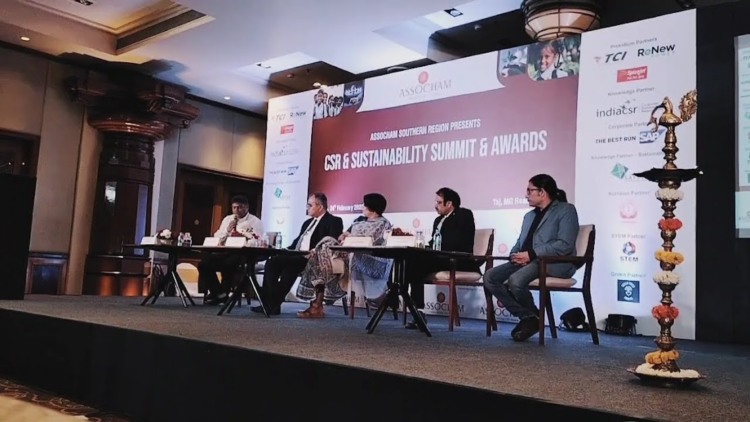BENGALURU: ASSOCHAM Southern Region organized CSR Summit in Bengaluru on Feb 26. It had the presence of Minister CN Aswath Narayana, Minister of Information Technology – Biotechnology, Higher Education, Science and Technology of Karnataka.
The prestigious forum had a Panel Discussion on NEP – 21st-century Skills & Edtech Intervention. The panel discussion had esteemed speakers representing Corporate, Academia, Civil Society and Media. This panel featured Rusen Kumar, Founder and Managing Editor, India CSR; Sudeepta Banerjee Co-Founder and CEO Raise Topi; Gunjan Patel Regional Director and Head CSR, SAP; and Prof. Shiv K. Tripathi, Vice-Chancellor, ATMIYA University, Surat.
The panel was preceded by the keynote address by Prof. Thimme Gowda, VC Karnataka State Higher Education Council followed by the second keynote speaker Sandeep Talwar COO Akshay Patra. Prof Gowda stressed the postulates of NEP 2020 and the transformation it will bring in the education system of India right from the School level to the Higher Studies.
Prof. Shiv K Tripathi, Vice-Chancellor, ATMIYA University Surat spoke about the transformation that will commence once NEP 2020 is implemented. He termed it as AFTER effect. Accountability: NEP will bring accountability among all the stakeholders an individual. Flexibility: The system and process must be flexible for the students to allow them to develop competency as per their interests and needs. Transparency: The entire system must be transparent for both seeker and provider. This will help us to maintain and measure the quality of education that is being imparted
Experiential: Learning The method used for imparting education must be experiential. This allows the students to have a practical understanding. Relevance: The most important aspect is the relevance of the knowledge that is being imparted among the students. They must be able to implement their learning in their day-to-day life.
The second panelist Gunjan Patel Regional Director and Head CSR, SAP highlighted the digital divide existing in the country. The consequence is the widening of the divide between rich and poor. This divide is not just confined at the technological level rather it stretches at the level of quality of teachers, resources, infrastructure etc. He mentioned that only ten percent of Indian school infrastructure is digitally enabled. He also mentioned that the best way to solve this challenge is collaboration. As per him, the way forward for the CSR projects is to have collaboration at Corporate Level. To bridge the gap, multiple companies need to come together and execute a big project at the block and district levels.
Once there was clarity about NEP 2020 and its implementation and the digital divide, the entire discussion moved towards an understanding of the 21st Century Skills to be developed among the youth.
This is where the third panelist of the evening Ms. Sudeepta Banerjee, Co-Founder and CEO Raise Topi drew attention to the fact 63% of the corporate is currently dealing with a talent crunch. While around 50% of the student population is struggling to find a job. According to her the schools and the higher education system must impart skill training as part of the curriculum. Some of the most important skills that are the need of the 21st century are Ownership, Dedication, Persistence, Real-world Experience and Consistency.
In addition to this Final Panelist of the forum Rusen Kumar, Founder and managing editor of India CSR emphasized the accessibility of education for all, especially at the bottom line of the pyramid. Education is a fundamental right in our country, every citizen and the government have to send every child to school. At school, the students must be imparted with Numerical Literacy, Science & Mathematical Skills and Solution-Based Learning.
He emphasized the fact that youth must be imparted with entrepreneurial and intrapreneurial skills. This will make them industry ready and develop a solution-based approach towards life. The purpose of education is to empower young minds and enable them to find solutions to the challenges faced by them and society.
The panel discussion was being moderated by Nav Kishlay, Founder Arcmind Consultancy. The panel came to a common conclusion w.r.t. the way forward for CSR Projects i.e., Collaboration. It could happen at various levels – Corporate & Civil Society, Corporate and Corporate, Corporate, Civil Society and Government (Public-Private Partnership).
An example is the adoption of districts and blocks by a consortium of around 10 corporations to upgrade the infrastructure and systems of the government schools in the area. This also focuses on TTT programs for teachers, staff and other stakeholders. The PPP model is also another way to work within the CSR Projects. One example is Build Operate Transfer (BOT). This has multiple stakeholders like government, corporate, civil society. The ownership of the operations must be shared with the local community. With the participation of all the stakeholders within a PPP model, it will be possible to implement NEP and bridge the gap of Digital Divide across the country.
Overall, the panel indicated the path of collaboration for the implementation of CSR. This might also pave the way for Impact investment and Social Entrepreneurship. The collaboration also extends at the level of stakeholders in a project. This in turn will increase the credibility, legitimacy, accountability, service orientation and power of the project and will make it impactful.























